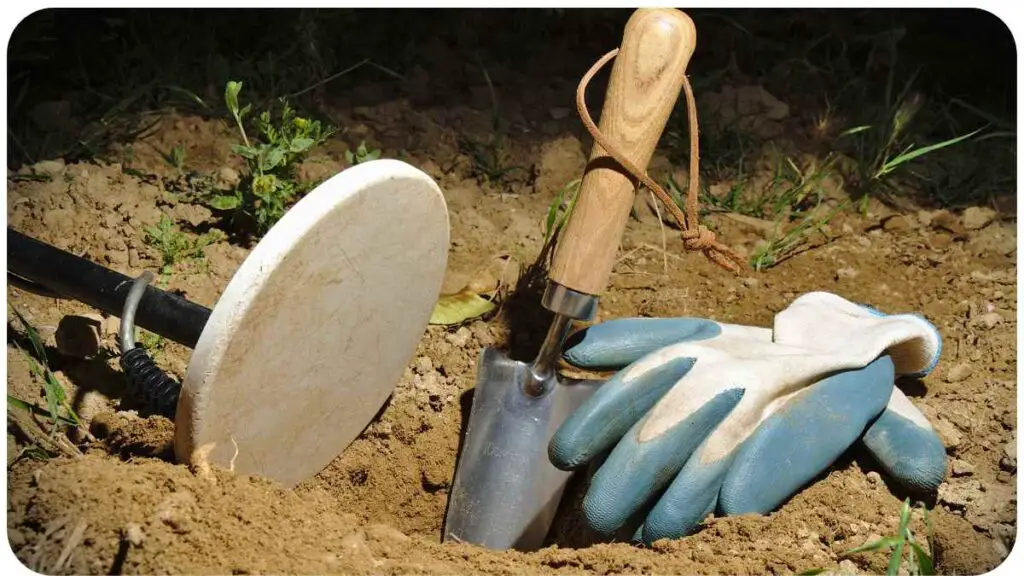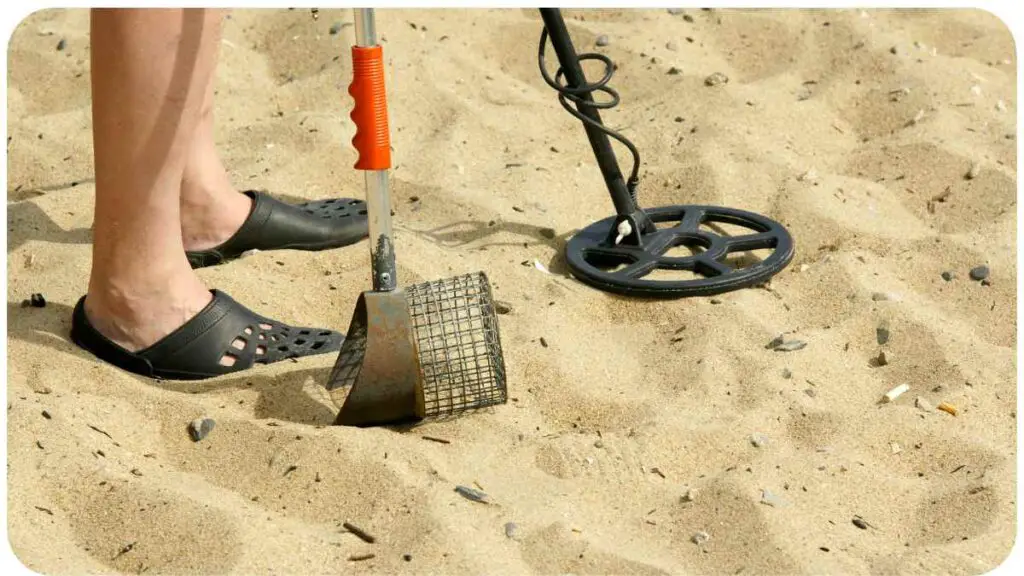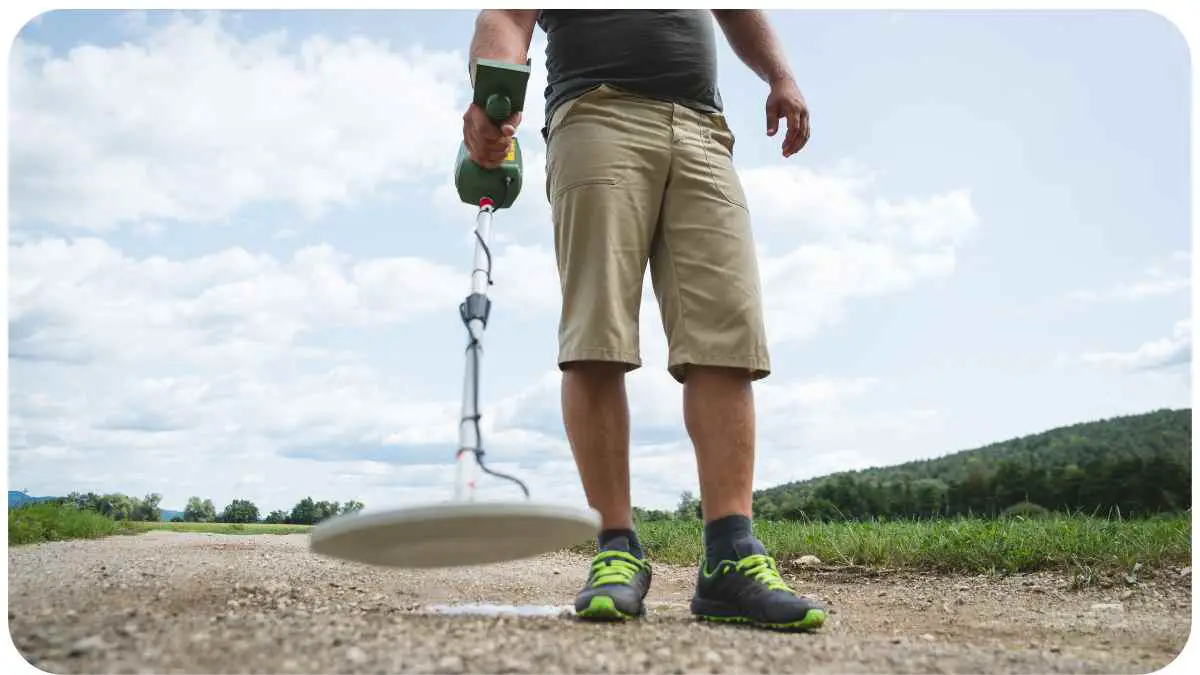Welcome to our comprehensive guide on using metal detectors to find gold! If you’ve ever dreamed of unearthing hidden treasures firsthand, this article is for you. In this guide, we’ll explore the fascinating world of gold prospecting and how you can leverage the power of modern metal detectors to increase your chances of success.
Metal detecting for gold is a thrilling activity that combines elements of adventure, history, and the desire to strike it rich. However, it’s essential to have the right knowledge, tools, and approach to increase your chances of finding that elusive golden nugget. This article will provide you with valuable insights, proven techniques, and practical advice to help you on your quest for gold.
So, let’s dive in and uncover all the secrets to finding gold with a metal detector!
| Takeaway |
|---|
| Choose a metal detector suitable for gold prospecting based on your budget, experience level, and desired features. |
| Research public gold prospecting areas, join clubs, and use online resources to find the best locations for gold prospecting. |
| Consider essential accessories like pinpointers, headphones, and coil covers to enhance your gold prospecting experience. |
| Understand the limitations of gold prospecting, such as the need for skill and experience, variable success rates, and legislative constraints. |
| Adhere to local regulations, practice proper technique, and remain patient and persistent in your gold prospecting pursuits. |
Understanding Metal Detectors
How Metal Detectors Work
Before we delve into the specifics of finding gold, it’s crucial to understand how metal detectors work. Metal detectors are electronic devices that emit an electromagnetic field and detect disturbances caused by metallic objects. When a metal object is in proximity, it disrupts the electromagnetic field, triggering an audible or visual response from the detector.
Metal detectors consist of a control box, search coil, and shaft. The control box houses the circuitry and controls, while the search coil emits the electromagnetic field and receives signals. As you sweep the coil over the ground, the detector analyzes the received signals and alerts you when it detects metal.
Embarking on a new hobby can be daunting, but understanding the basics of metal detecting is crucial. Dive into the Beginner’s Guide to Metal Detecting to ensure you start on the right foot and make your treasure hunting experience fruitful
Types of Metal Detectors
Metal detectors come in various types, each with its strengths and weaknesses. Understanding these types will help you choose the right one for your gold prospecting adventures:
1. Very Low-Frequency (VLF) Detectors
VLF detectors are the most common type and are highly versatile. They operate by generating two coils – a transmitter and a receiver – which create a magnetic field. When the transmitter coil’s magnetic field encounters metal, it induces a response in the receiver coil, producing a signal.
VLF detectors are excellent at discriminating between different types of metal, allowing you to filter out unwanted objects like nails and pull tabs. They are ideal for general-purpose metal detecting, including gold prospecting.
| Brand | Model | Price | Features |
| Garrett | AT Pro | $599 | Submersible up to 10 feet, Iron audio, Pro mode audio |
| Minelab | Equinox 800 | $899 | Multi-IQ simultaneous frequency technology |
| Fisher | Gold Bug Pro | $649 | Multiple modes, Ground balancing, Fe3O4 non-ferrous mineral indicator |
2. Pulse Induction (PI) Detectors
PI detectors are highly sensitive to larger and deeper targets, making them ideal for serious gold prospecting. Unlike VLF detectors, PI detectors use a single coil to generate both the transmit and receive signals. This leads to greater depth penetration and better performance in highly-mineralized soils.
It’s worth noting that PI detectors are less effective at discriminating between different types of metal, so you may dig up more trash targets in the process.
| Brand | Model | Price | Features |
| Garrett | AT Pro | $599 | Submersible up to 10 feet, Iron audio, Pro mode audio |
| Minelab | Equinox 800 | $899 | Multi-IQ simultaneous frequency technology |
| Fisher | Gold Bug Pro | $649 | Multiple modes, Ground balancing, Fe3O4 non-ferrous mineral indicator |
These models have gained recognition and positive reviews among gold prospecting enthusiasts due to their exceptional performance and features. However, it’s important to consider your budget and specific requirements before making a decision on which metal detector to invest in.
Metal detecting can be a rewarding pastime, especially if you’re equipped with the right knowledge. By checking out Metal Detecting for Beginners: How to Get Started, you can learn key tips and tricks to make your search more efficient and enjoyable.
Features to Consider
When choosing a metal detector for gold prospecting, several features should be considered to enhance your detection capabilities. Here are some key features to keep in mind:
- Ground Balance: This feature allows the detector to adjust itself to the mineralization of the soil, reducing false signals and improving target detection.
- Frequency: Higher frequencies are better for detecting smaller gold nuggets, while lower frequencies are useful for deeper targets.
- Discrimination: The ability to discriminate between different types of metals helps filter out undesirable targets.
- Target ID: A target ID feature provides information about the type of metal detected, giving you a better idea of what lies beneath the surface.
- Waterproofing: If you plan on detecting in rivers or wet environments, consider a waterproof or submersible detector.
By considering these features and taking into account your budget, you can select a metal detector that suits your needs and maximizes your chances of striking gold.
Now that we have explored the basics of metal detectors, let’s dive deeper into the pros and cons of metal detecting for gold.
Pros and Cons of Metal Detecting for Gold

Metal detecting for gold comes with its set of advantages and limitations. Understanding these can help you make informed decisions and set realistic expectations for your gold prospecting journey.
Advantages of Metal Detecting for Gold
- Accessibility: Metal detecting for gold requires minimal equipment and can be enjoyed by people of all ages and fitness levels.
- Thrill of Discovery: Unearthing gold nuggets or artifacts with a metal detector can provide a thrilling sense of adventure and accomplishment.
- Historical Exploration: Gold prospecting often leads to exploring historically significant areas, allowing you to learn about local history and heritage.
- Hobby with Potential Profit: Discovering valuable gold nuggets can result in a lucrative return on investment, turning a hobby into a profitable endeavor.
- Outdoor Recreation: Gold prospecting takes you into nature, providing an opportunity to enjoy the beauty and tranquility of the great outdoors.
Success in metal detecting isn’t just about having the best equipment. It’s equally crucial to know the techniques. The 10 Tips for Successful Metal Detecting article offers valuable insights to boost your chances of discovering hidden treasures
Limitations of Metal Detecting for Gold
- Skill and Experience Required: Successful gold prospecting requires knowledge, practice, and patience to interpret signals, distinguish targets, and develop effective techniques.
- Variable Success Rates: While metal detecting for gold can be rewarding, finding significant amounts of gold is not guaranteed and often relies on factors like location, timing, and luck.
- Environmental Factors: Challenging terrains, extreme weather conditions, and highly-mineralized grounds can complicate the prospecting process.
- Intense Competition: Popular gold prospecting areas may attract substantial competition, increasing the difficulty of finding untouched ground.
- Legislative Constraints: Gold prospecting may be subject to legal requirements, restrictions, and permit regulations, which vary depending on location.
Tips for Success
To enhance your chances of success while metal detecting for gold, keep these tips in mind:
- Research Potential Sites: Prioritize researching areas with known gold deposits or historical significance for gold prospecting. Geology maps, local history books, and online resources can provide valuable information.
- Join Local Prospecting Clubs: Connecting with experienced prospectors in a local community or joining a prospecting club can provide access to valuable insights, tips, and shared experiences.
- Practice Proper Technique: Learn and practice effective sweeping patterns, target identification, and digging techniques to optimize your gold prospecting skills.
- Persistence and Perseverance: Gold prospecting can be challenging at times, but persistence is key. Remember, every beep from your metal detector brings you closer to potential treasures.
Now that we’ve covered the pros and cons, it’s time to explore the crucial aspect of choosing the right metal detector for your gold prospecting adventures.
Choosing the Right Metal Detector
Choosing the right metal detector is an important step in your gold prospecting journey. With a wide range of options available, it’s essential to consider various factors and features to ensure you make an informed decision. Here are some key aspects to consider when selecting a metal detector for gold prospecting:
Factors to Consider
- Budget: Determine your budget range to narrow down the available options. Remember to consider other necessary accessories and equipment costs in addition to the detector itself.
- Experience Level: Consider your level of expertise as a prospector. Some detectors may be better suited for seasoned prospectors, while others are user-friendly for beginners.
- Terrain and Conditions: Evaluate the type of terrain and environmental conditions where you plan to prospect. Some detectors are better suited for highly-mineralized or wet ground.
- Frequency and Sensitivity: Higher frequencies generally provide better sensitivity to smaller gold nuggets, while lower frequencies are better for deeper targets.
- Discrimination Features: Look for detectors with effective discrimination features to help distinguish between valuable targets and unwanted ferrous items.
- Weight and Portability: Consider the weight and portability of the detector, especially if you plan on long prospecting sessions or hiking to remote locations.
Many have dreamt of finding buried treasures, and legends of lost gold mines have fueled these dreams for centuries. Embark on an exciting journey as you explore the Legend of Lost Gold Mines and the secrets they hold
Recommended Metal Detectors for Gold

While there are numerous excellent metal detectors available, we have compiled a list of recommended models that have proven to be reliable and effective for gold prospecting:
| Brand | Model | Price | Features |
| Garrett | AT Pro | $599 | Submersible up to 10 feet, Iron audio, Pro mode audio |
| Minelab | Equinox 800 | $899 | Multi-IQ simultaneous frequency technology |
| Fisher | Gold Bug Pro | $649 | Multiple modes, Ground balancing, Fe3O4 non-ferrous mineral indicator |
These models provide a range of features suitable for both beginners and experienced prospectors. Be sure to research and compare different models, considering your specific needs and budget.
Essential Accessories for Gold Prospecting
To optimize your gold prospecting experience, certain accessories are worth considering. These accessories provide additional functionality, convenience, and protection. Here are some essential accessories for gold prospecting:
- Pinpointers and Diggers: Pinpointers help you precisely locate targets within a small area, saving time and effort. A digger or trowel is essential for digging up targets once located.
- Headphones: Good quality headphones can enhance your ability to hear faint signals amidst noisy environments. They also provide privacy and prevent disturbing fellow prospectors.
- Coil Covers and Pouches: Coil covers protect the search coil from scratches and damage, while pouches can hold your finds, tools, and other small accessories securely.
Remember, these accessories are not mandatory but can significantly enhance your metal detecting experience and make your gold prospecting outings more productive.
Now that you have a better understanding of metal detectors and the necessary accessories, it’s time to explore the best locations for gold prospecting.
Best Locations for Gold Prospecting
Finding the right locations for gold prospecting is crucial for increasing your chances of success. While gold can be found in various regions, researching and targeting specific areas with a history of gold deposits significantly enhances your prospects. Here are some tips to help you find the best locations for gold prospecting:
Public Gold Prospecting Areas
- Public Land: Research and explore public lands open to gold prospecting, such as national forests, Bureau of Land Management (BLM) areas, or state parks. These areas often have regulations and permits in place, so be sure to familiarize yourself with the rules before detecting.
- Gold Prospecting Clubs: Joining a local gold prospecting club can provide access to private claims, shared knowledge, and fellow prospectors who can guide you towards productive areas. These clubs often have exclusive access to prime gold-bearing locations.
- Recreational Gold Panning Sites: Some states have designated recreational gold panning sites where you can try your luck without obtaining a full-scale mining permit. These sites may be on existing gold-bearing rivers or have artificially seeded gold for recreational purposes.
Researching Potential Sites
- Geological Maps: Geological maps can provide valuable information about gold-bearing regions, geological formations, and past mining activities. Look for areas with known gold deposits or areas that have similar geological characteristics to known gold-producing areas.
- Historical Documents: Historical records, books, and old mining reports can provide insight into past mining activities and locations where gold has been found. Local libraries, historical societies, and online archives can be valuable resources for historical research.
- Online Resources: Utilize online forums, websites, and social media groups dedicated to gold prospecting. Fellow prospectors often share their experiences, tips, and knowledge about productive locations. However, be mindful of protecting sensitive information and avoid over-harvesting popular sites.
Modern metal detectors offer advanced capabilities that can help treasure hunters dive deeper and find treasures buried well beneath the surface. Delve deeper into the world of Deep Search Metal Detectors to understand their unique features and advantages
Private Property Permissions
If you have access to private property where gold prospecting may be feasible, ensure you obtain proper permission from the landowner before beginning any prospecting activities. Respecting private property rights and building positive relationships with landowners is essential for long-term access to potentially rich gold-bearing areas.
Remember, research and preparation are key elements in finding the best locations for gold prospecting. Now that you have an idea of where to search, let’s explore some essential techniques for gold detection.
Conclusion
In conclusion, gold prospecting with a metal detector can be an exciting and rewarding hobby, offering the possibility of uncovering valuable gold nuggets and artifacts. By considering factors such as budget, experience level, terrain, and desired features, you can choose the right metal detector for your gold prospecting adventures.
We explored recommended metal detectors such as the Garrett AT Pro, Minelab Equinox 800, and Fisher Gold Bug Pro, which have proven effective for gold detection and offer a range of features to enhance your prospecting experience. Additionally, we discussed essential accessories like pinpointers, headphones, and coil covers that can improve your efficiency and enjoyment while out in the field.
Finding the best locations for gold prospecting requires thorough research. Public gold prospecting areas, joining clubs, researching geological maps, historical documents, and obtaining private property permissions are all valuable strategies for targeting gold-rich areas and increasing your chances of success.
Gold prospecting has its advantages, including its accessibility, the thrill of discovery, and the potential for profit. However, it also has limitations such as the need for skill and experience, variable success rates, environmental factors, competition, and legislative constraints. Understanding these pros and cons will help you set realistic expectations and enjoy your gold prospecting pursuits.
Remember to adhere to local regulations, practice proper technique, and remain persistent and patient. Gold prospecting is not a guaranteed endeavor, but with dedication and knowledge, you can increase your odds of finding precious gold and enjoying the adventure of a lifetime.
Happy prospecting!
Further Reading
Here are some additional resources for further reading on gold prospecting with metal detectors:
Can Metal Detectors Detect Gold?: This article provides insights into the capabilities of metal detectors in detecting gold and explains the factors that affect their detection abilities.
Can You Find Gold Nuggets with Metal Detectors?: Discover the potential of metal detectors in locating gold nuggets and learn about the techniques and settings that can improve your chances of finding them.
How to Use a Metal Detector to Find Gold Nuggets: This guide offers helpful tips and techniques for using a metal detector specifically to search for gold nuggets, taking into account factors like ground conditions, frequencies, and discrimination settings.
FAQs
Here are some frequently asked questions about gold prospecting with metal detectors:
Are all metal detectors capable of detecting gold?
Not all metal detectors can detect gold effectively. Some models are specifically designed for gold prospecting, while others may have limited sensitivity to small gold nuggets.
Can metal detectors find gold nuggets buried deep underground?
Metal detectors can detect gold nuggets buried deep underground, but the depth range depends on various factors such as the detector’s sensitivity, the size of the nugget, and the mineralization of the soil.
What settings should I use on my metal detector for gold prospecting?
Ideal settings for gold prospecting vary depending on the detector and the specific conditions. Generally, using higher frequencies, manual ground balancing, and minimizing discrimination can improve your chances of finding gold.
Is gold prospecting legal everywhere?
Gold prospecting regulations vary from one location to another. It’s crucial to familiarize yourself with local laws and obtain any necessary permits or permissions before engaging in gold prospecting activities.
Are there specific locations more likely to have gold deposits?
Certain geological features, such as ancient riverbeds, areas with known gold mining history, and places with high mineralization, are more likely to have gold deposits. Researching geological maps and historical information can help identify potential locations.

Hi there! My name is Hellen James, and I’m here to talk to you about treasure hunting. I’ve been a fan of treasure hunting ever since I was a kid, and if you’re a fan of treasure hunting or just like the idea of finding a long-lost fortune, then this blog is for you.

